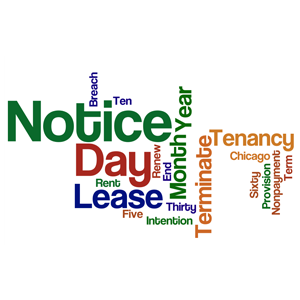CHECK OUT OUR NEWEST WEBSITE:
www.chicagoeviction.com – a resource for landlords!
The First Step In an Eviction
In most cases, before a landlord may file a forcible entry and detainer action, a landlord must prepare and serve some sort of notice of termination of tenancy on the tenant. (It is said that a proper eviction notice is usually a “jurisdictional requirement” of bringing an eviction lawsuit.) The law, the lease, and the reason for the eviction will determine the type of notice required. In a few instances, no notice is necessary.
Generally, the most common notices for an eviction cause of action are:
Five Day Notice for Nonpayment of Rent
Ten Day Notice for Breach of a Lease Provision
Thirty Day Notice to Terminate a Month to Month Tenancy
Sixty Day Notice to Terminate a Year to Year Tenancy
Notice of Intention not to Renew Lease at End of a Chicago Lease Term
Each notice addresses a different basis for eviction. In addition, a written lease might modify, waive, or change the notice requirements. If a notice is not properly drafted and properly served, a landlord will not be able to lawfully evict a tenant in court.
Five Day Notice
 A five day notice is normally served in cases involving non-payment of rent. Only those charges deemed as “rent” should be included in the notice (in many cases, landlord’s mistakenly and improperly include other amounts due such as an unpaid security deposit or late fees into the notice and therefore provide the tenant with a possible defense against the notice in court).
A five day notice is normally served in cases involving non-payment of rent. Only those charges deemed as “rent” should be included in the notice (in many cases, landlord’s mistakenly and improperly include other amounts due such as an unpaid security deposit or late fees into the notice and therefore provide the tenant with a possible defense against the notice in court).
Additionally, the Illinois Forcible Entry and Detainer Statute requires that all notices for failure to pay rent must include the following language: “Only FULL PAYMENT of the rent demanded in this notice will waive the landlord’s right to terminate the lease under this notice, unless the landlord agrees in writing to continue the lease in exchange for receiving partial payment.”
Despite the language required by the Illinois statute, tenancies governed by the Chicago Residential Landlord Tenant Ordinance are subject to law that invalidates and waives the landlord’s right to proceed to an eviction based upon a five day notice if the landlord accepts any rent after the service of the five day notice.
Ten Day Notice
A ten day notice is served in cases where a tenant has  breached a term of a lease. The notice must be particular as to the tenant’s action that breaches the lease and the provision of the lease that has been breached. In Chicago tenancies governed by the Chicago Residential Landlord Tenant Ordinance, the ten day notice must include a ten day period to cure the lease violation.
breached a term of a lease. The notice must be particular as to the tenant’s action that breaches the lease and the provision of the lease that has been breached. In Chicago tenancies governed by the Chicago Residential Landlord Tenant Ordinance, the ten day notice must include a ten day period to cure the lease violation.
Thirty Day Notice
 A thirty day notice is served in cases involving the termination of a month to month lease. A thirty day notice is also the most common notice used to terminate a tenancy when the occupant does not have a lease, such as in roommate or family member eviction. The 30 day notice can be tricky because the date of termination on a thirty day notice must be the last day of the next full rental period.
A thirty day notice is served in cases involving the termination of a month to month lease. A thirty day notice is also the most common notice used to terminate a tenancy when the occupant does not have a lease, such as in roommate or family member eviction. The 30 day notice can be tricky because the date of termination on a thirty day notice must be the last day of the next full rental period.
Sixty Day Notice
A sixty day notice is served in cases involving the termination  of a year to year tenancy. The notice may be given at any time within 4 months preceding the last 60 days of the year.
of a year to year tenancy. The notice may be given at any time within 4 months preceding the last 60 days of the year.
Notice of Intent Not To Renew
 Leases governed by the Chicago Residential Landlord Tenant Ordinance (and in some other municipalities) do not expire by their own terms. Instead, the landlord must first serve on the tenant a notice of intent not to renew an existing lease. Only once this notice is served and the appropriate time expires can the landlord evict a tenant who refuses to move out of a CRLTO governed premises at the expiration of the lease term.
Leases governed by the Chicago Residential Landlord Tenant Ordinance (and in some other municipalities) do not expire by their own terms. Instead, the landlord must first serve on the tenant a notice of intent not to renew an existing lease. Only once this notice is served and the appropriate time expires can the landlord evict a tenant who refuses to move out of a CRLTO governed premises at the expiration of the lease term.
Service of Notice
Eviction notices are best served personally upon the tenant or anyone over the age of thirteen who resides in the premises in question. The Illinois statute also provides that certified or registered mail return receipt requested is an acceptable manner of service. In our experience, this method is less successful in practice because tenants in trouble generally do not sign for certified or registered mail and if they do sign, it is difficult to prove that the signature on the return receipt actually belongs to the tenant. Finally, if a tenant has abandoned the property (this is something completely different from just being “out” when the landlord comes around), the landlord can post a notice on the door.
Problems with Notices
Without proper review of a lease and the facts surrounding a tenancy, it is difficult to know which notice to use and what to include in the notice. Landlords should be careful when acting with a notice because a great amount of time can be wasted if the landlord serves an improper notice, files an eviction case, obtains service on the tenant, only to have the judge throw out a notice for a technical defect.
Services and Fees
Reda | Ciprian | Magnone, LLC handles most aspects of the eviction process. We will routinely review your lease and tenancy situation (billed on an hourly basis) and provide services for the preparation of termination notices to tenants (5, 10, 30, 60 day notices, and notices of intent not to renew) for a fee of about $125.00 (approximately 30 minutes of attorney time). For further information on our eviction services, click here.
How to Get Started
The first step to the eviction process is to review the tenancy situation and determine the notice, if any, required to be served upon the tenant. For engaged clients, we will review a landlord’s lease and/or tenancy, provide advice on the appropriate eviction notice, and draft a notice on behalf of a landlord for a fee of about $125.00.
In addition to notice drafting, Reda | Ciprian | Magnone, LLC represents landlords in eviction actions. Unfortunately, we do not take on cases after they have already been filed (we generally do not take on cases in the middle of the process) nor do we handle evictions based upon mortgage rescues.
To learn more and discuss the possibility of engaging Reda | Ciprian | Magnone, LLC to assist you to get the eviction notice drafting process started, please feel free to contact Richard Magnone or one of our eviction associates at 773-399-1122. The majority of evictions we handle are in Cook County, and depending on our caseload, we also sometimes handle cases in Lake and DuPage County. Feel free to contact us and if we cannot assist, we might be able to provide a referral to an attorney in any of the collar counties surrounding Cook County.
Please see our updated policy on consultations related to eviction cases. We are generally willing to have a short (5 to 10 minutes) initial discussion over the telephone to determine if we can assist in your situation and to determine if we might be an appropriate match to work with you. We do not dispense legal advice during that conversation. It is our policy that we do not get involved in eviction cases that have already been filed with the court or that have been worked on by another attorney.
To get this process started, please feel free to contact Richard Magnone via email or by phone at 773-399-1122.

